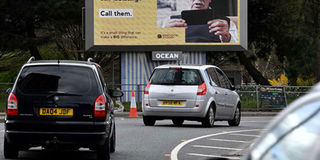Coronavirus ‘house arrest’ brings memories of detention in the past

Signs on the side of a road alert motorists to stay in phone contact with anyone they may know who is self-isolating due to Covid-19, in Manchester, northern England on March 28, 2020. PHOTO | PAUL ELLIS | AFP
What you need to know:
- Kindly e-mails and phone calls assure me of their willingness to bring me whatever I need, enjoining me at the same time not to leave my home.
- Certainly, to do otherwise would seem to them not only ungrateful, but stubbornly and dangerously stupid. And no doubt it is.
Most foreign correspondents, at some point in their careers, experience a period of involuntary inactivity when they are unable to report, write or file dispatches.
This is because they are being detained by men with writs, handcuffs or guns.
Right now, nobody is pointing a firearm at me, but I cannot help but feel a connection with my long-ago unhappy experiences in Jordan and Yemen as I look wistfully out of my window at people out jogging, heading for the shops or exercising their dogs.
You will have guessed that I am under house arrest and my captor is the coronavirus, or at least the threat of contracting it from a fellow citizen.
The government has brought in tough restrictions on people’s movements and I cannot shake the feeling that people are furtively watching each other, particularly me.
Strictly speaking, I am entitled to go shopping for food or medication or to leave the house for exercise once a day.
VULNERABLE
However, being well over the biblical three score years and ten, such activities seem no longer acceptable in the eyes of others, mostly, I confess, my family and friends.
Kindly e-mails and phone calls assure me of their willingness to bring me whatever I need, enjoining me at the same time not to leave my home.
Certainly, to do otherwise would seem to them not only ungrateful, but stubbornly and dangerously stupid. And no doubt it is. But still.
There’s a newsagent’s stall and a coffee shop at the bottom of my street where I could grab a paper and a sandwich, stretch my legs and breathe fresh air.
It’s scarcely a hundred yards, it would only take five minutes…
* * *
The pandemic is just about all that anybody, including newspapers, TV and radio, is talking about.
Naturally, myths about the virus are spreading rapidly. These include: 1. If you can hold your breath for 10 seconds, you are free of the virus. 2. Cow urine can prevent it (widely believed in India). 3. The virus clings to surfaces for as long as three months. 4. Homemade sanitisers are as good as the official versions.
The experts say: 1. Not true. 2. No evidence for that. 3. The virus can clear much quicker than three months. 4. The quality is not there.
* * *
Whatever new crisis arises, some low-life will be there to take advantage.
In Gateshead, a small town in the north of England, crooks have been knocking on doors, posing as medics and offering to test the residents for the coronavirus.
A Council spokesman said: “This is a scam by people who are trying to gain access to your home. No testing is being carried out except in medical facilities and certainly not in people’s homes. If someone comes to your door offering to test you for coronavirus, even if they show what appears to be a medical ID, do not admit them, contact the police.”
* * *
A Victorian fort built out at sea to protect Britain from invasion has gone on sale. Situated between Portsmouth and the Isle of Wight, No Man’s Land Fort can only be reached by boat or helicopter. How’s that for a millionaire looking to self-isolate?
* * *
Electric scooters are popular in many cities around the world, but it is illegal to use them on public roads or paths here in the UK.
However, that could be changing. The Department of Transport has begun consultations on conditions under which E-scooters could be allowed.
These would include a minimum age for riders, speed limits, use of helmets and insurance.
Transport Secretary Grant Shapps said the UK was “on the cusp of a transport revolution as emerging technologies are ripping up the rule books”.
E-scooters will initially be tried out in four test zones: Portsmouth and Southampton, the West of England, Derby and Nottingham and the West Midlands.
* * *
Learner drivers fearing they would not pass their tests paid Samson Calin some £35,000 (Ksh4,554,980) to take their place and secure the necessary marks.
Using fake IDs, Calin sat at least five theory exams and one practical for “customers”, who then took to the roads despite being unqualified.
Calin, 21, from Enfield in north London, was arrested on December 17 after his activities aroused suspicion.
He was released by police and committed a fresh fraud just five days later. At Guildford crown court, he admitted six fraud offences and was jailed for 16 months.
PC Kathryn Sandys said Calin’s complete disregard for the law had “resulted in a number of unqualified drivers on the roads, putting other road users at risk.”
* * *
Last word on the virus: 1. No hugging. 2. No kissing. 3. No social interaction. Sounds like married life with a cough.





